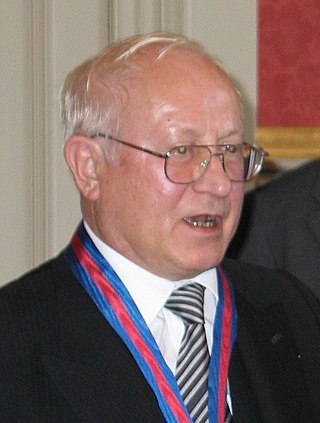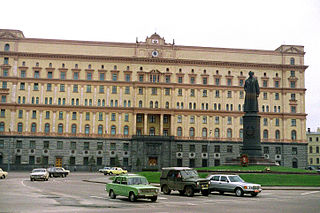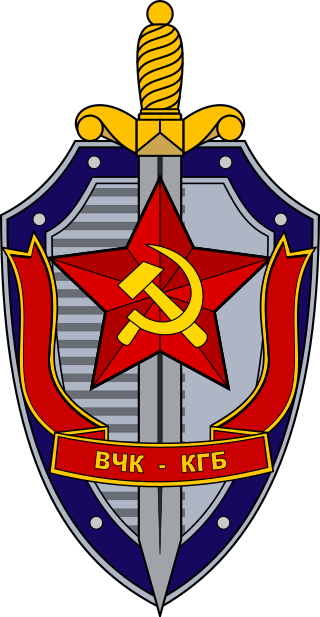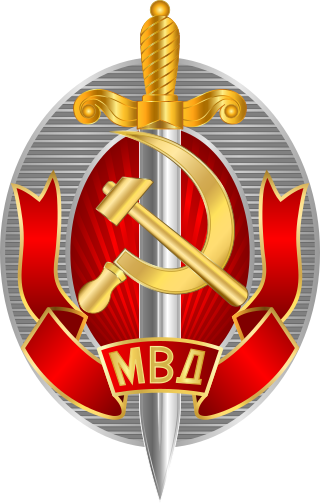Related Research Articles

Leon Theremin was a Russian and Soviet inventor, most famous for his invention of the theremin, one of the first electronic musical instruments and the first to be mass-produced. He also worked on early television research. His listening device, "The Thing", hung for seven years in plain view in the United States Ambassador's Moscow office and enabled Soviet agents to eavesdrop on secret conversations.
A covert listening device, more commonly known as a bug or a wire, is usually a combination of a miniature radio transmitter with a microphone. The use of bugs, called bugging, or wiretapping is a common technique in surveillance, espionage and police investigations.

The Cambridge Spy Ring was a ring of spies in the United Kingdom that passed information to the Soviet Union during World War II and was active from the 1930s until at least into the early 1950s. None of the known members was ever prosecuted for spying. The number and membership of the ring emerged slowly, from the 1950s onwards. The general public first became aware of the conspiracy after the sudden flight of Donald Maclean and Guy Burgess to the Soviet Union in 1951. Suspicion immediately fell on Harold "Kim" Philby, who eventually fled to the Soviet Union in 1963. Following Philby's flight, British intelligence obtained confessions from Anthony Blunt and then John Cairncross, who have come to be seen as the last two of a group of five. Their involvement was kept secret for many years: until 1979 for Blunt, and 1990 for Cairncross. The moniker Cambridge Four evolved to become the Cambridge Five after Cairncross was added.

Oleg Antonovich Gordievsky, CMG is a former colonel of the KGB who became KGB resident-designate (rezident) and bureau chief in London, and was a double agent, providing information to the British Secret Intelligence Service (MI6) from 1974 to 1985. After being recalled to Moscow under suspicion, he was exfiltrated from the Soviet Union in July 1985 under a plan code-named Operation Pimlico. The Soviet Union subsequently sentenced him to death in absentia.

Active measures is political warfare conducted by the Soviet or Russian government since the 1920s. It includes offensive programs such as espionage, propaganda, sabotage, and assassination. The programs were based on foreign policy priorities of the Soviet Union.
The Intelligence Directorate, commonly known as G2 and, until 1989, named Dirección General de Inteligencia (DGI), is the main state intelligence agency of the government of Cuba. The DI was founded in late 1961 by Cuba's Ministry of the Interior shortly after the Cuban Revolution. The DI is responsible for all foreign intelligence collection and comprises six divisions divided into two categories, which are the Operational Divisions and the Support Divisions.
Nathan Gregory Silvermaster, an economist with the United States War Production Board (WPB) during World War II, was the head of a large ring of Communist spies in the U.S. government. It is from him that the FBI Silvermaster File, documenting the Bureau's investigation into Communist penetration of the Federal government during the 1930s and 1940s, takes its name. His wife, Helen and stepson, Anatole Volkov, were members of his ring.

Morris Cohen, also known by his alias Peter Kroger, was an American convicted of espionage for the Soviet Union. His wife Lona was also an agent. They became spies because of their communist beliefs.
Yuri Vasilevich Krotkov was a Soviet dramatist. Working as a KGB agent, he defected to the West in 1963.
As early as the 1920s, the Soviet Union, through its GRU, OGPU, NKVD, and KGB intelligence agencies, used Russian and foreign-born nationals, as well as Communists of American origin, to perform espionage activities in the United States, forming various spy rings. Particularly during the 1940s, some of these espionage networks had contact with various U.S. government agencies. These Soviet espionage networks illegally transmitted confidential information to Moscow, such as information on the development of the atomic bomb. Soviet spies also participated in propaganda and disinformation operations, known as active measures, and attempted to sabotage diplomatic relationships between the U.S. and its allies.

Aleksandr Semyonovich Feklisov was a Soviet spy, the NKVD Case Officer who handled Julius Rosenberg and Klaus Fuchs, among others.
The "Mitrokhin Archive" is a collection of handwritten notes which were secretly made by the KGB archivist Vasili Mitrokhin during the thirty years in which he served as a KGB archivist in the foreign intelligence service and the First Chief Directorate. When he defected to the United Kingdom in 1992, he brought the archive with him, in six full trunks. His defection was not officially announced until 1999.

Bohdan Mykolayovych Stashynsky is a former Soviet spy who assassinated the Ukrainian nationalist leaders Lev Rebet and Stepan Bandera in the late 1950s. He defected in West Berlin in 1961.

The Embassy of the United States of America in Moscow is the diplomatic mission of the United States of America in the Russian Federation. The current embassy compound is in the Presnensky District of Moscow, across the street from the White House and near the Moscow Zoo.

The 1977 Moscow bombings were a series of three terrorist bombings in Moscow on 8 January 1977. The attacks killed seven people and seriously injured 37 others. No one claimed responsibility for the bombings, although three members of an Armenian nationalist organization were executed early in 1979 after a KGB investigation and a secret trial. Some Soviet dissidents said that the suspects had an alibi. Soon after the event Andrei Sakharov issued a public appeal, expressing concern that the bombings might "be a new provocation on the part of the organs of repression". According to historian Jay Bergman, "who actually caused the explosion has never been determined conclusively".

The KGB was the main security agency for the Soviet Union from 13 March 1954 until 3 December 1991. As a direct successor of preceding agencies such as the Cheka, GPU, OGPU, NKGB, NKVD and MGB, it was attached to the Council of Ministers. It was the chief government agency of "union-republican jurisdiction", carrying out internal security, foreign intelligence, counter-intelligence and secret-police functions. Similar agencies operated in each of the republics of the Soviet Union aside from the Russian SFSR, with many associated ministries, state committees and state commissions.

The Ministry of Internal Affairs of the USSR was the interior ministry of the Soviet Union from 1946 to 1991.
Vasily Mikhailovich Zarubin was a Soviet intelligence officer. In the United States, he used the cover name Vasily Zubilin and served as the chief Soviet intelligence Rezident from 1941 to 1944. Zarubin's wife, Elizaveta, served with him.

Vadim Viktorovich Bakatin was a Russian politician who served as the last chairman of the KGB in 1991. He was the last surviving former chairman of this organization. He was appointed to dismantle the KGB, but he was unable to control this organization and to fulfill the task due to political reasons. However, he was able to fulfill a plan to disintegrate the intelligence agency into separate organizations. He ran for the Russian presidency as an independent candidate in June 1991.

Operation Monopoly was a covert plan by the United States Federal Bureau of Investigation (FBI) to build a tunnel underneath the Soviet Embassy in Washington, D.C. to gather secret intelligence.
References
- ↑ "Russia: Fumigating the Fumigator", Time , September 25, 1964, retrieved 2022-11-22
- ↑ Barron, John. KGB: The Secret Work of Soviet Secret Agents. 1974.